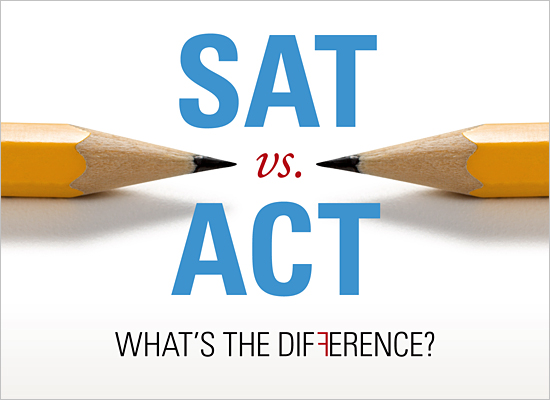An important difference between the SAT and the ACT is the essay. Thankfully, with the new SAT, there is no longer a required essay (you'll probably still have to take it for most colleges, though). The SAT essay, new this year, gives the student a long passage or excerpt (usually about 650 words) that requires them to study the author's purpose and message. The ACT, on the other hand, gives you different "perspectives" to choose on a certain prompt, without a passage to analyze. So, in short, the SAT tests your ability to understand another's writing and write about it, while the ACT tests how you can develop and structure an argument. In both tests, the essay is not calculated into your composite score, but acts as a separate score.
Tip: Essay readers LOVE to see advanced grammar, but don't force it!
The Math section between the two is quite unique as well. The new SAT has a non-calculator, a grid-in, and a calculator section, while the ACT only has one calculator section (with no grid-ins). The SAT Math delves deep into specific subjects, yet the topics are usually simpler than the ACT Math. However, the SAT Math is graded much harsher than the ACT Math. Missing three on the SAT will likely not be an 800, while missing three on the ACT will probably still give you a 36. The SAT also covers a lower level of math: usually only up to Algebra 1st Year and Geometry. The ACT, on the other hand, covers up to 2nd Year Algebra. Another thing to consider is that the SAT only has four answer choices on the new SAT Math, while the ACT has five answer choices. This makes it harder for the test taker to guess on the ACT Math, and easier to guess on the SAT.
Tip: Don't rush through the first couple of easy questions - get into a groove and keep it!
Another difference between the SAT and the ACT is that the ACT has an extra section: Science. While the SAT does have graphs and tables to interpret in the Math section, the ACT requires the test taker to interpret these graphs/tables in the context of a scientific debate or experiment in an additional section. To some students, this Science section is their death knell, but to do well all one really needs is a little common sense and LOTS of practice.
Tip: Of all the sections, Science is the easiest one to improve by practice, practice, practice!
Possibly the most important difference between the ACT and the SAT is speed. The ACT throws a lot of surface level questions at you in a short amount of time, requiring the student to be a quick thinker, familiarized with basic concepts, and able to handle pressure. The SAT, on the other hand, is still quick but not flying-by-the-seat-of-my-pants quick. To score well on the SAT, the makers of the test know that students will need a little extra time to figure out their tricky problems. The best way to study for each is, thus, taking multiple practice tests of each in order to work on your speed. Because more speed means more extra time, it allows the test taker to go back and check over their answers (which can make the difference!) and think deeper about certain problems they are unsure about.
Tip: When practicing, give yourself less time than they allot in order to better learn the balance between speed and accuracy!
Now that I have outlined the differences of each test, why should most everyone try both? Well, speaking from personal experience, one can score vastly different varying from one test to the other. After taking the SAT three times during my Junior year, my superscore (which means taking the best from each section) was a 2110 (out of 2400, at the time). This score was good, by standard means, but not great. I had been aiming for a 2250+ in order to be an above average applicant at almost all schools. On a whim I decided to try out the ACT, just to see how I'd do. With very little studying, the first time I took it I scored a 31 out of 36: very close to the equivalent 2110 SAT score. I decided to study hard and take it again over the next couple of months, which garnered a score of 33, and again in a couple more months, garnering a score of 35! So, compared to taking the SAT three times, my ACT score after three times was significantly better.
Tip: After scoring over a certain threshold, let's say 1450+ or 33+, your test scores are in the ballpark. Only retake for a better score if you know other parts of your application are weak.
Overall, the SAT tests how you can think, while the ACT tests what you know. It can be hard to decide which test is the best for you, so I'd recommend taking each once, and then the test that you prefer, take once or twice more if you want to continue to improve your scores. I probably took over 20 combined ACT and SAT practice tests in order to familiarize myself with the tests, and I also used both the SAT and ACT official study guides.
Tip: Powerscore.com and kaptest.com are good resources for practice questions and full-length practice tests. Also, don't forget to sign up for TCE's FREE Tutoring Program!









